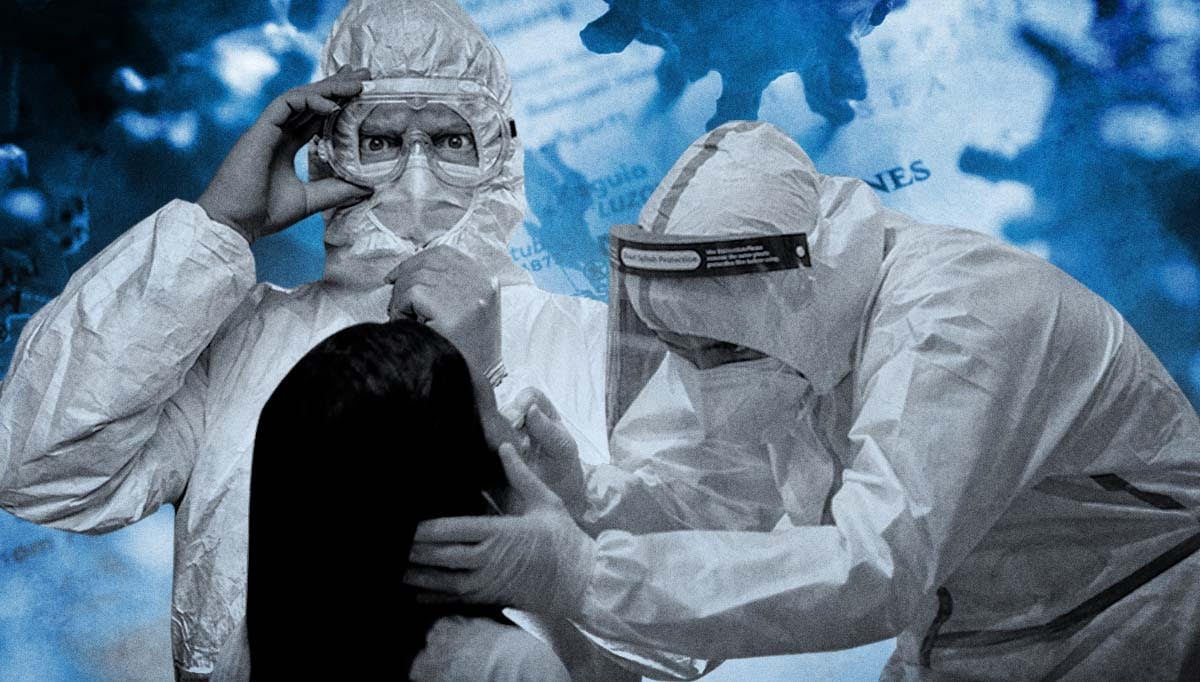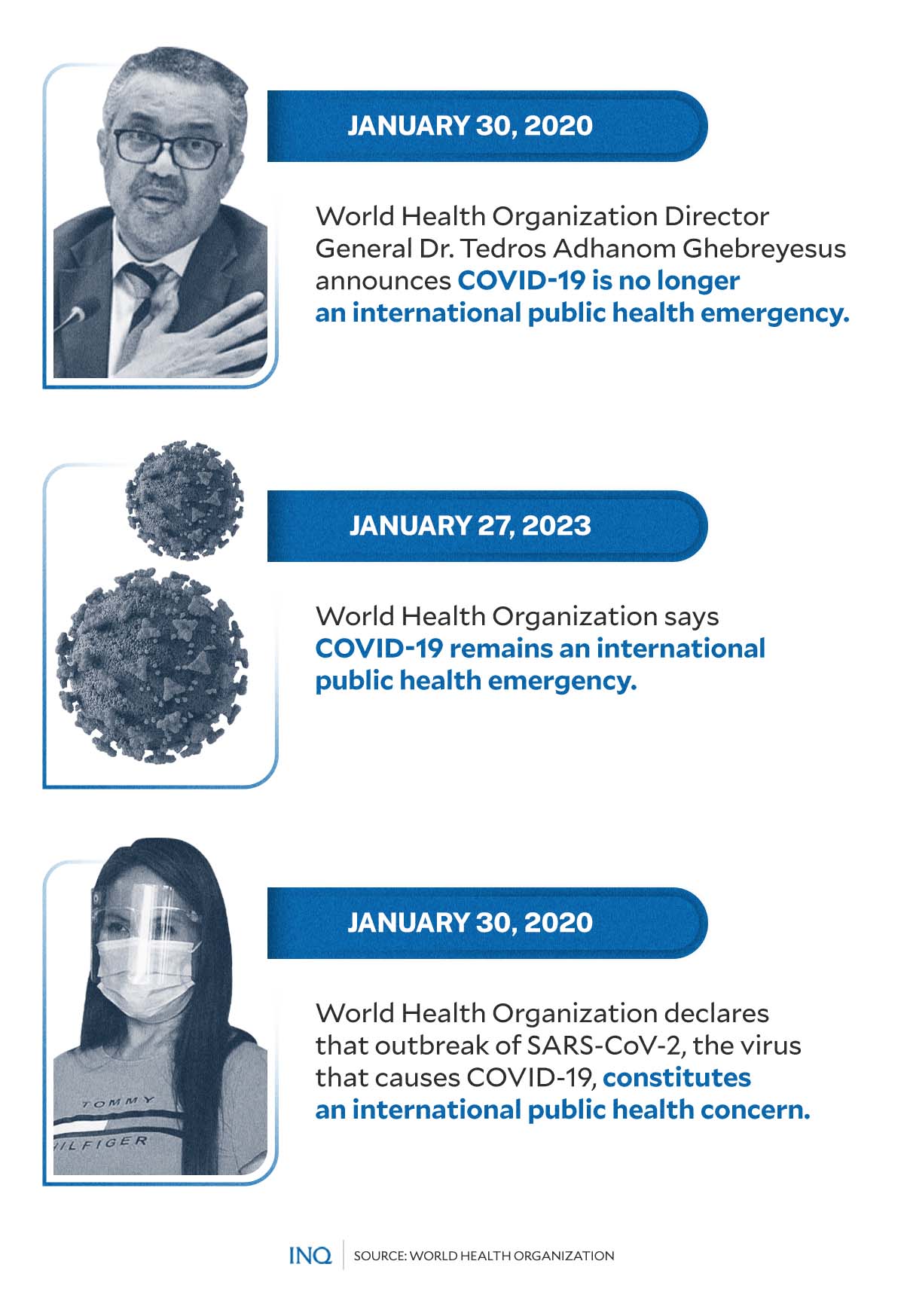EXPLAINER COVID still kills 1 person every 3 minutes, so why is it no longer an international emergency?
MANILA, Philippines—Over three years since the COVID-19 outbreak was classified as a global health emergency, the World Health Organization (WHO) has declared that the disease will no longer be categorized as a Public Health Emergency of International Concern (PHEIC).
On May 5, WHO Director-General Dr. Tedros Adhanom Ghebreyesus—heeding advice offered by the International Health Regulations (2005) (IHR) Emergency Committee—lifted the PHEIC status for COVID-19.
READ: COVID-19 no longer a global health emergency, says WHO
“For the past year, the (COVID-19) Emergency Committee and WHO have been analyzing the data carefully and considering when the time would be right to lower the level of alarm,” said Ghebreyesus in a statement.
He said the emergency committee met for a 15th time and recommended that he declare an end to the classification of COVID as a PHEIC. “I have accepted that advice,” he said.
“It’s therefore with great hope that I declare COVID-19 over as a global health emergency,” the WHO chief added.
But what does the declaration mean, and how does this impact the pandemic response of countries, like the Philippines?
COVID is not over
While WHO declared COVID-19 over as a global health emergency, Ghebreyesus stressed that the disease’s global health threat is far from over.
“Last week, COVID-19 claimed a life every three minutes – and that’s just the deaths we know about. As we speak, thousands of people around the world are fighting for their lives in intensive care units,” he said.
“And millions more continue to live with the debilitating effects of post-COVID-19 condition. This virus is here to stay. It is still killing, and it’s still changing. The risk remains of new variants emerging that cause new surges in cases and deaths,” he continued.
READ: WHO: Covid-19 no longer global health emergency
Data from WHO showed that as of May 3, there are 765,222,932 confirmed cases of COVID-19 worldwide. Of those, at least 6,921,614 were fatal.
In the Philippines, data recorded by the Department of Health (DOH) showed that as of May 7, there are 4,102,788 confirmed COVID-19 cases in the country and 66,453 confirmed deaths.
The decision to lift COVID-19’s PHEIC status, according to Ghebreyesus, was based on the decreasing trend in COVID-19 deaths, the decline in COVID-19-related hospitalizations and intensive care unit admissions, and the high levels of population immunity to SARS-CoV-2—the virus that causes COVID-19.
“I emphasize that this is not a snap decision. It is a decision that has been considered carefully for some time, planned for, and made on the basis of a careful analysis of the data,” the WHO director general said.
“If need be, I will not hesitate to convene another emergency committee should COVID-19 once again put our world in peril,” he added.
At a meeting last January 27, the IHR Emergency Committee acknowledged that the COVID-19 pandemic might be at a “transition point” but kept its PHEIC status.
The Committee agreed that the PHEIC was then “required to maintain global attention to COVID-19, the potential negative consequences that could arise if the PHEIC was terminated, and how to transition in a safe manner.”
READ: WHO revises COVID guidelines: What to know
PHEIC, pandemic: Not the same
The PHEIC status for COVID-19 is over, but the pandemic is still not—why?
WHO previously said that in the COVID-19 situation, we are in both PHEIC and a pandemic situation. However, the PHEIC and the term pandemic hold meanings that are very different from each other.
The PHEIC is the highest level of alarm by the WHO under the IHR, which triggers a coordinated international response. As defined by the IHR, a PHEIC is “an extraordinary event which is determined to constitute a public health risk to other [countries] through the international spread of disease.”
WHO explained that a PHEIC status implies a situation that is:
- serious, sudden, unusual, or unexpected;
- carries implications for public health beyond the affected State’s national border; and
- may require immediate international action
“The idea of declaring a PHEIC… is to coordinate that immediate action before the event becomes even bigger and potentially becomes a pandemic,” said Maria Van Kherkove, WHO’s technical lead on COVID-19, in a statement.
A pandemic is widely defined as an outbreak of a disease usually caused by a new virus or bacteria—which spreads quickly and affects the global population.
“While the emergency is over, COVID is not. The virus is evolving, there will be more waves of infection. We need to continue to prevent infections, severe disease, [long COVID], deaths. Sustain momentum in all pillars of the response. Vigilance,” said Kherkove.
“We may be in a pandemic for quite some time because this virus is here with us to stay—which means we have to take measured actions,” she added.
What’s next?
Following the recent declaration, WHO said the emergency committee members emphasized the uncertainties of the evolving SARS-CoV-2 virus—noting that it is time to transition to long-term COVID-19 pandemic management.
“This virus is here to stay. It is still killing, and it’s still changing. The risk remains of new variants emerging that cause new surges in cases and deaths,” said Ghebreyesus.
“The worst thing any country could do now is to use this news as a reason to let down its guard, to dismantle the systems it has built, or to send the message to its people that COVID-19 is nothing to worry about,” he said.
“What this news means is that it is time for countries to transition from emergency mode to managing COVID-19 alongside other infectious disease,” he added.
Ghebreyesus announced that he had decided to use a provision in the IHR to establish a review committee to develop long-term, standing recommendations for countries on how to manage COVID-19 on a continuing basis.
Aside from that, WHO also listed some temporary recommendations, including:
- sustaining countries’ national capacity gains and preparing for future events to avoid the occurrence of a cycle of panic and neglect
- integrating COVID-19 vaccination into regular immunization programs
- gathering information from various respiratory pathogen surveillance data to allow higher awareness
- preparing for medical countermeasures and imposing national regulatory frameworks to ensure long-term availability and supply
- working with communities and leaders “o achieve strong, resilient, and inclusive risk communications and community engagement (RCCE) and infodemic management programmes”
- lifting COVID-19 international travel related health measures—considering results of risk assessments
- supporting research related to COVID-19 to improve vaccines, understand the impact of post COVID-19 condition and the evolution of SARS-CoV-2
TSB
For more news about the novel coronavirus click here.
What you need to know about Coronavirus.
For more information on COVID-19, call the DOH Hotline: (02) 86517800 local 1149/1150.
The Inquirer Foundation supports our healthcare frontliners and is still accepting cash donations to be deposited at Banco de Oro (BDO) current account #007960018860 or donate through PayMaya using this link.





